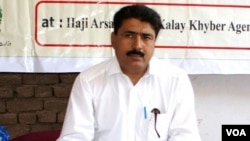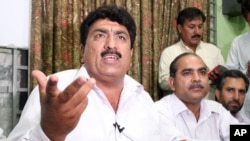He’s known in the U.S. Congress as “Dr. Hero” for his alleged role in finding al-Qaida mastermind Osama bin Laden. But in his native Pakistan, Dr. Shakil Afridi has been cast as a traitor, locked away for nearly six years in a slippery, tangled case that has strained bilateral relations.
It’s a tale that has played out as part spy novel, with Afridi involved in a CIA-linked plan to find bin Laden with a fake vaccination operation, and part political controversy in increasingly conservative Pakistan, where the physician is jailed in a tribal area that operates under an antiquated colonial legal system.
Despite U.S. pressure for Afridi to be released, it’s unclear how much effort the national government is putting into the case, which is seen as a litmus test of Pakistan’s fight against militancy but could lead to a public backlash if Afridi were freed.
"We believe Dr. Afridi has been unjustly imprisoned and have clearly communicated our position to Pakistan on Dr. Afridi's case, both in public and in private,” a State Department said in a statement to VOA this week. “We continue to raise this issue at the highest levels during discussions with Pakistan's leadership. Pakistan has assured us that Dr. Afridi is being treated humanely and is in good health."
Representing Afridi is not just fraught with frustration, current counsel Qaram Nadeem has not seen his client in 34 months, it’s also dangerous. Nadeem’s predecessor, Samiullah Afridi, gave up the case and moved to Dubai after threats from al-Qaida affiliates. He was gunned down in March 2015 after returning, with Taliban splinter groups Jundullah and Jamaatul Ahrar claiming responsibility.
“The tribal tribunal has adjourned his case for 30 times so far, as the state prosecutor abstains from appearing before the court,” Nadeem told VOA. The last hearing, scheduled for April 12, was called off with the prosecutor a no-show once again.
“Due to (the) high sensitivity of the case, we are proceeding with care and not over-pushing for hearing,” he said, expressing his frustration while demonstrating understandable prudence.
The hunt for bin Laden
The widely circulated story is that Afridi ran a fake hepatitis vaccination in Abbottabad -- where the CIA had gotten intelligence that bin Laden was hiding out – to get DNA samples to confirm his presence. The use of a fake campaign sparked criticism from aid groups who said it would cast suspicion on legitimate projects and put aid workers at risk.
A raid by an elite SEAL team killed the terror leader and four others on May 2, 2011. Bin Laden was buried at sea almost immediately.
Days later, Afridi was arrested at the Torkham border crossing, apparently trying to flee into Afghanistan. He was convicted in May 2012 of treason for allegedly providing financial support to a local militant group in tribal regions adjacent to Afghanistan. His appeal is pending at a tribal court, with rules that date back to 1901 and are different from Pakistan’s regular set of laws.
Afridi was tried in a tribal court headed by a bureaucrat. The court sentenced him for 33 years, and only a tribal tribunal has the power to hear the appeal. Nadeem is not allowed to see Afridi despite a higher court order allowing them to meet.
The United States has withheld $33 million in aid for Pakistan -- $1 million for each year of his sentence – but Islamabad has resisted all pressure so far.
President Donald Trump’s election victory last November raised hopes among Afridi’s family and friends that things might change. Trump was critical of Pakistan’s treatment of the doctor during his campaign, telling Fox News that he would get Afridi released in “two minutes.”
Pakistan bristled at the claim. Interior Minister Choudhry Nisar Ali Khan said nobody had the right to dictate to the country about how to handle Afridi’s case.
For their part, Afridi’s family has avoided talking about the case since his arrest. His brother, Jamil Afridi, told VOA through his counsel that the entire family is frustrated with the legal proceedings.
“We the family want both the U.S. and Pakistan to find a diplomatic solution for his release as his children are suffering,” Jamil Afridi said. “We don’t want to comment on the tribunal proceedings and don’t want to create problems for Pakistan.”












